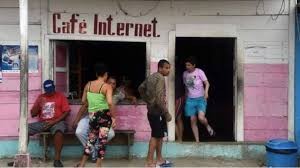U.S. INTERNET GIANT GOOGLE HAS TO “DO WHAT CUBA SAYS” (ENTRAR POR EL ARO).
Google may be the Internet giant, but Cuba has had to go through the hoop. On Wednesday, the newly released Google + Local Kcho.Mor opened its doors late due to the lateness of the employee who keeps the keys and fumigation against Aedes aegypti that filled the whole place with a thick, gray smoke. Even those setbacks made abandon the dozen people who waited outside to connect to the Internet.
..and Even though all the brand new project Google has also bowed to the Government in blocking web pages. In the new service site remain “presillados” portals like Cubaencuentro, Revolico or 14ymedio. Censorship is that the service provider is the connection Telecommunications Company (ETECSA), the state monopoly that maintains control over who can and can not be opened on their servers.
The brand new project Google has also bowed to the Government in blocking websites
However, queues do not stop every hour and only 20 numbered tickets are delivered. Previously, the user must leave all your belongings in storage, except their identity card, without which it is impossible to receive one of the inputs. It is forbidden to access cameras, phones, USB drives and laptops. All photos posted inside the premises only been able to make the official press and some foreign correspondents who were allowed to spread the new project.
Although initially he talked about the possibility of using storage devices such as USB sticks or external hard drives, take home or upload information to the web material, at least until Wednesday was not allowed. This limitation gives the room an aspect of museum navigation: look, touch and go, but without taking anything, seem to warn employees. The novel experience boils down to having surfed the internet from ChromeBook 15 that are in place.
This place is tight and users do not enjoy privacy as they move through the world wide web. Several employees supervise every gesture and look over the shoulder open pages on the screens.
“The problem is that this is a library and here you can not speak loudly,” one worker described the place to this day. As for the schedule, the young ensures that until now are opening up “from 7:00 am to 12:00 pm, but the early hours are reserved for previously coordinated visits.”
A group of members of the Immigration and Nationality section Interior Ministry left center Wednesday just before they entered the first 20 people in line. “Yesterday came the dress green, the Minint the truth … Now, I do not understand is why these people have some priority,” he told Dorian, a neighbor of Google + Kcho.Mor center.
“Yesterday came the dress green, the Minint the truth … Now, I do not understand is why these people have some priority,” he told Dorian, a neighbor of Google + Kcho.Mor center.
Yuli, a junior year medical mark in the queue again after making use of Chromebooks because he had no time to find the information I needed. “As you can not copy anything, what I do is I command it to my Gmail account and then download and I’ll take it anywhere else,” he explains. Her boyfriend, who is studying art at the Higher Institute of Art (ISA), that the day before was able to visit several “virtual impressive way thanks to espejuelitos cardboard” places. It refers to the cardboard, virtual reality platform for mobile, also donated by Google.
Particularly striking is the low speed of navigation in the new hall when it was announced that the local, inserted in the Organic Museum Romerillo (MOR) carrying the artist Kcho, would have a 70 times greater connection than that offered in wifi areas the rest of the country. Several users commented on the outskirts defrauded local feel to the difficulty of Youtube videos or use other services that require higher bandwidth.
Despite the obstacles, waiting, numbered tickets and inability to take digital content to home users seem mesmerized by nothing but sit in front of them and move at full speed hands on the keyboard screen to keep one second access to the web.
From the wall, a huge picture of Fidel Castro with a Cuban flag looks. On the computer screen, an electronic cintillo shows one of the last sentences that the president Barack Obama wrote: “We do not need the empire regale us nothing.”
14ymedio / Luz Escobar, Havana / Internet Photos / Extracts / TheCubanHistory.com
THE CUBAN HISTORY, HOLLYWOOD.
Arnoldo Varona, Editor.
EL GIGANTE NORTEAMERICANO GOOGLE “ENTRA POR EL ARO” EN CUBA.
Puede que Google sea el gigante de internet, pero en Cuba ha tenido que entrar por el aro. Este miércoles, el recién estrenado local Google+Kcho.Mor abrió tarde sus puertas debido a la impuntualidad del empleado que guarda las llaves y a la fumigación contra el Aedes aegypti que llenó todo el local de un humo espeso y gris. Ni siquiera esos contratiempos hicieron desistir a la decena de usuarios que esperaban a las afueras para conectarse a Internet.
..Y todo a pesar de que el flamante proyecto de Google también se ha doblegado ante el Gobierno en el bloqueo de páginas web. En el nuevo servicio sitio se mantienen “presillados” portales como Cubaencuentro, Revolico o 14ymedio. La censura se debe a que el proveedor del servicio de conexión es la Empresa de Telecomunicaciones (Etecsa), el monopolio estatal que mantiene el control sobre los que puede y no abrirse en sus servidores.
El flamante proyecto de Google también se ha doblegado ante el Gobierno en el bloqueo de páginas web
Sin embargo, las colas no cesan y cada hora se entregan solo 20 tickets numerados. Previamente, el usuario debe dejar todas sus pertenencias en un guardabolsos, excepto su carné de identidad, sin el cual es imposible recibir una de las entradas. Está prohibido acceder con cámaras, teléfonos, memorias USB y laptops. Todas las fotos publicadas del interior del local solo han podido hacerlas la prensa oficial y algunos corresponsales extranjeros a los que se les ha permitido difundir el nuevo proyecto.
Pese a que en un principio se habló de la posibilidad de utilizar dispositivos de almacenamiento, como memorias USB o discos duros externos, para llevar información a casa o subir materiales a la web, al menos hasta este miércoles no estaba permitido. Esta limitación le confiere a la sala de navegación un aspecto de museo: mirar, tocar e irse, pero sin llevarse nada, parecen advertir los empleados. La experiencia novedosa se reduce a haber navegado en internet desde un ChromeBook de los 15 que hay en el lugar.
Este lugar es apretado y los usuarios no gozan de privacidad mientras se mueven por la gran telaraña mundial. Varios empleados supervisan cada gesto y miran por encima el hombro las páginas abiertas en las pantallas.
“El problema es que esto es una biblioteca y aquí no se puede hablar en voz alta”, describía uno de los trabajadores del lugar a este diario. En cuanto a los horarios, el joven asegura que hasta ahora están abriendo “de 7:00 am a 12:00 pm, pero las primeras horas están reservadas para visitas previamente coordinadas”.
Un grupo de miembros de la sección de Inmigración y Extranjería del Ministerio del Interior salía este miércoles del centro justo antes de que entraran las 20 primeras personas de la fila. “Ayer vinieron los vestidos de verde, los del Minint de verdad… ahora, lo que no entiendo es por qué esta gente tendrá alguna prioridad”, contaba Dorian, un vecino del centro Google+Kcho.Mor.
“Ayer vinieron los vestidos de verde, los del Minint de verdad… ahora, lo que no entiendo es por qué esta gente tendrá alguna prioridad”, contaba Dorian, un vecino del centro Google+Kcho.Mor.
Yuli, una estudiante de tercer año de medicina volvió marcar en la cola después de haber hecho uso de la Chromebooks porque no le dio tiempo a encontrar la información que necesitaba. “Como no se puede copiar nada, lo que hago es que me lo mando a mi cuenta de Gmail y luego lo descargo y me lo llevo en otro sitio”, detalla. Su novio, que estudia artes plásticas en el Instituto Superior de Arte (ISA), cuenta que el día anterior pudo visitar varios lugares “impresionantes de manera virtual gracias a los espejuelitos de cartón”. Se refiere a la cardboard, una plataforma de realidad virtual para móviles, donada también por Google.
Llama la atención la baja velocidad de navegación en la nueva sala cuando se había anunciado que el local, insertado en el Museo Orgánico Romerillo (MOR) que lleva el artista plástico Kcho, tendría una conexión 70 veces mayor que la ofrecida en las zonas wifi en el resto del país. Varios usuarios comentaban a las afueras del local el sentirse defraudados ante las dificultades para ver videos de Youtube o hacer uso de otros servicios que requieren un mayor ancho de banda.
A pesar de los obstáculos, la espera, los tickets numerados y la imposibilidad de llevarse contenido digital a casa, los usuarios parecen hipnotizados por las pantallas nada más sentarse frente a ellas y mueven a toda velocidad las manos sobre el teclado para no perder un solo segundo de acceso a la web.
Desde la pared, una inmensa foto de Fidel Castro junto a una bandera cubana los mira. En la pantalla de los ordenadores, un cintillo electrónico muestra una de las últimas frases que el expresidente escribió a Barack Obama: “Nosotros no necesitamos que el imperio nos regale nada”.
14ymedio/Luz Escobar, La Habana/Internet Photos/Extractos/TheCubanHistory.com
THE CUBAN HISTORY, HOLLYWOOD.
Arnoldo Varona, Editor.







